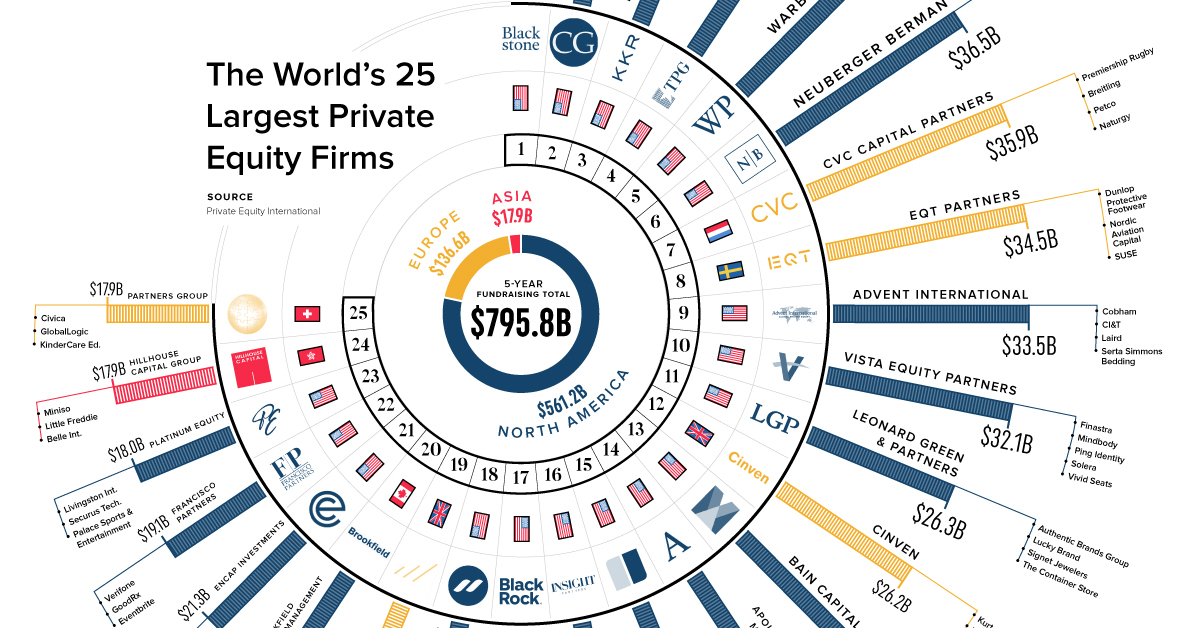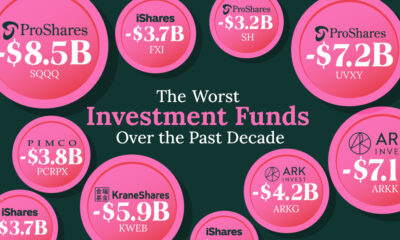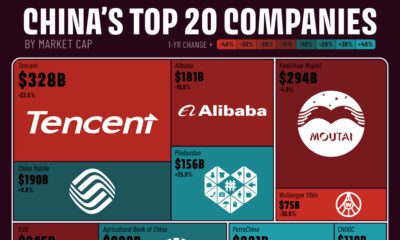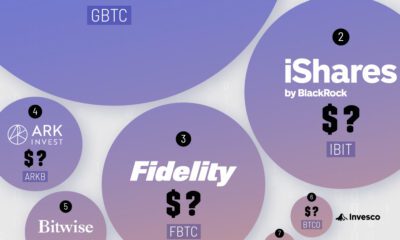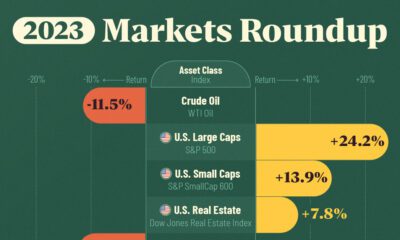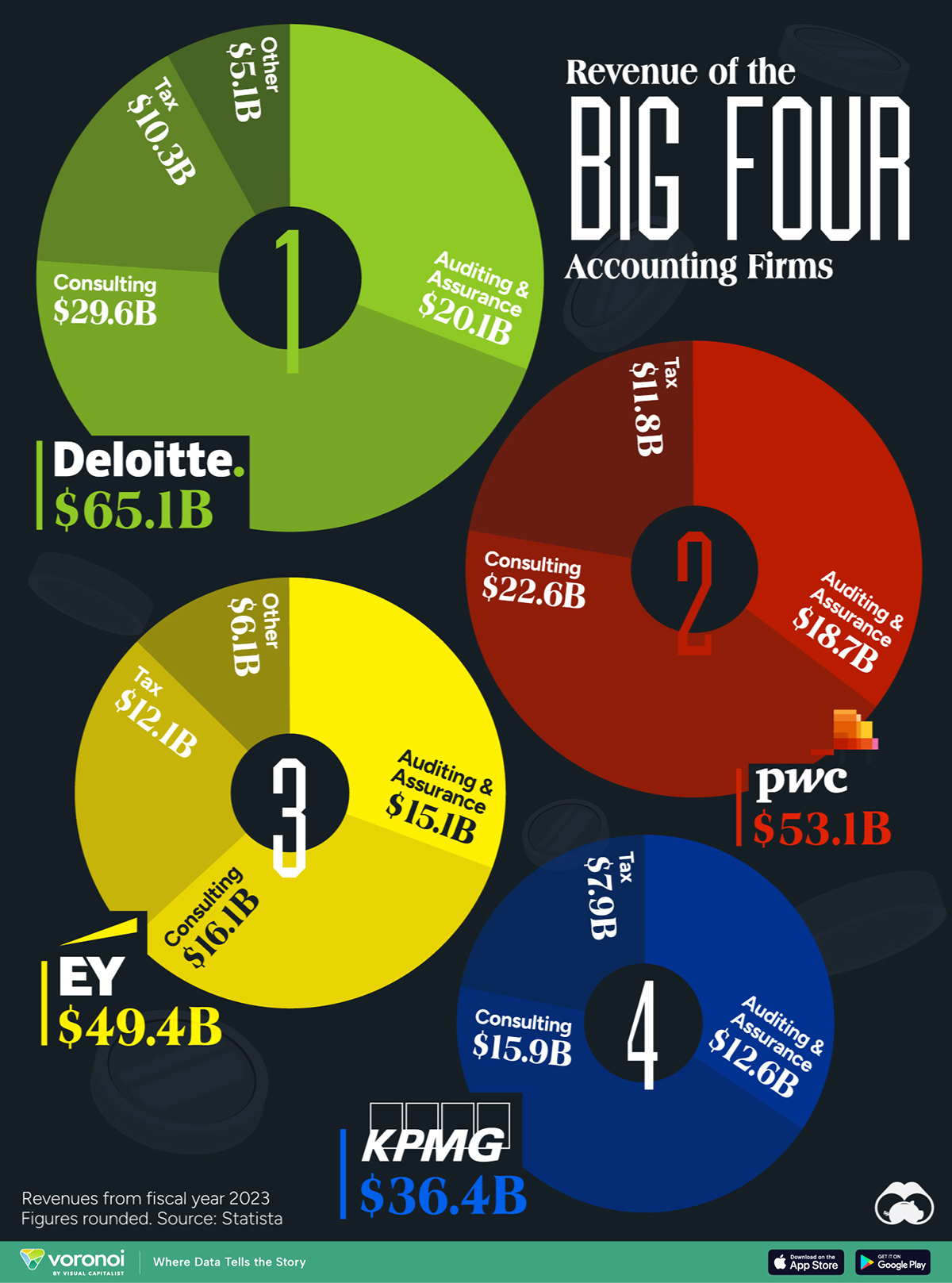Finance
The 25 Largest Private Equity Firms in One Chart
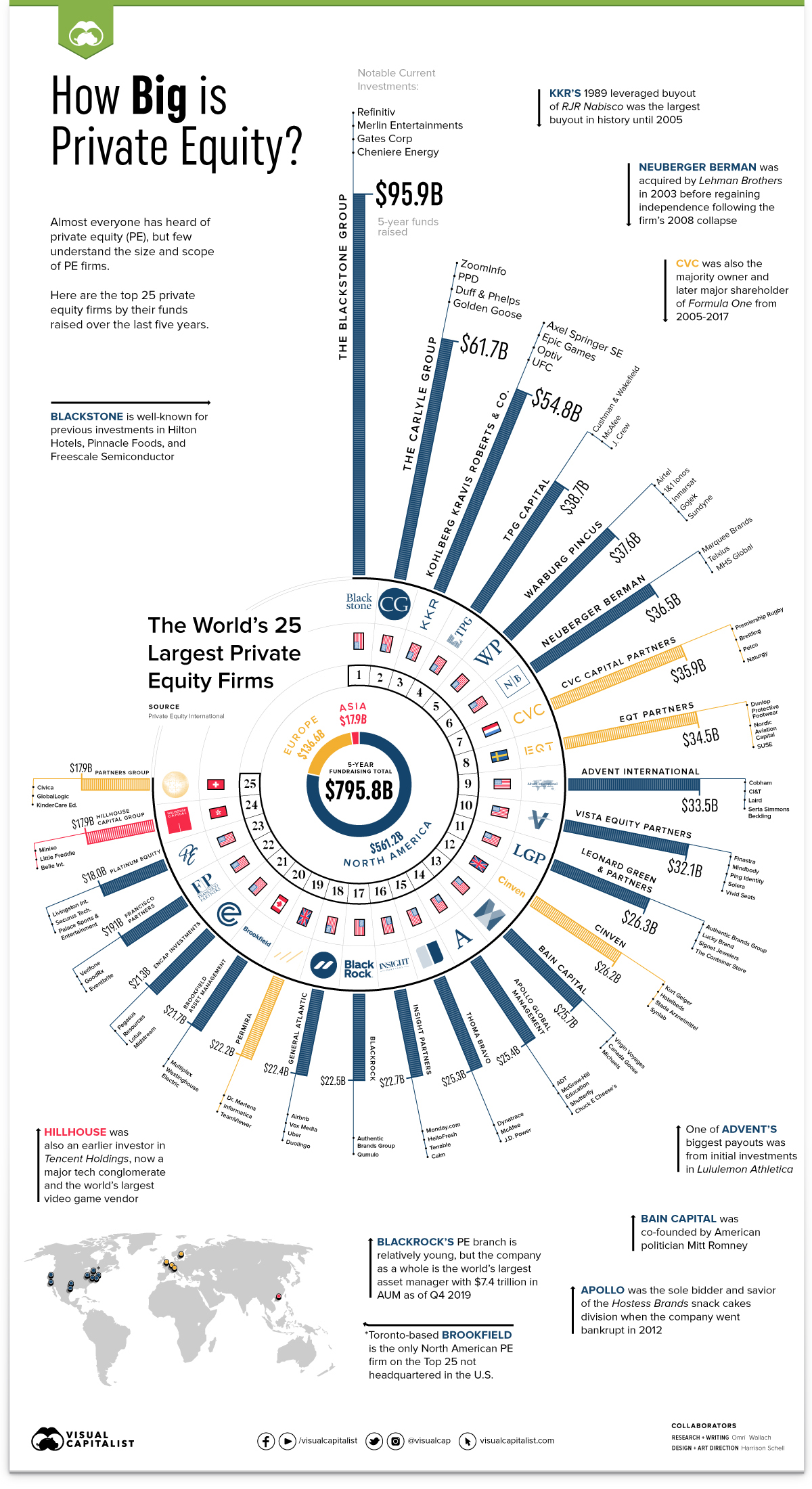
The 25 Largest Private Equity Firms Since 2015
Frequent the business section of your favorite newspaper long enough, and you’ll see mentions of private equity (PE).
Maybe it’s because a struggling company got bought out and taken private, just as Toys “R” Us did in 2005 for $6.6 billion.
Otherwise, it’s likely a mention of a major investment (or payout) that a PE firm scored through venture or growth capital. For example, after Airbnb had to postpone its original plans for a 2020 initial public offering (IPO) in light of the pandemic, the company raised more than $1 billion in PE funding to plan for a new listing later this year.
Yet many people don’t fully understand the size and scope of private equity. To demonstrate the impact of PE, we break down the funds raised by the top 25 firms over the last five years.
How Private Equity Firms Operate
First, we need to differentiate between private equity and other forms of investment.
A PE firm makes investments and provides financial backing to startups and non-public companies (or public companies that are being taken private).
Each firm raises a PE fund by pooling capital from investors, which it then uses to carry out transactions such as leveraged buyouts, venture and growth capital, distressed investments, and mezzanine capital.
Unlike other investment firms such as hedge funds, private equity firms take a direct role in managing their assets. In order to maximize value, that can mean asset stripping, lay-offs, and other significant restructuring.
Traditionally, PE investments are held on a longer-term basis, with the goal of maximizing the target company’s value through an IPO, merger, recapitalization, or sale.
The List: The Most PE Funds Raised in Five Years
So which names should you know in private equity?
Here are the largest 25 private equity firms by their five-year PE fundraising total over the last five years, with data on funds and investments from respective firms and Private Equity International.
They include well-known private equity houses like The Blackstone Group and KKR (Kohlberg Kravis Roberts), as well as investment managers with private equity divisions like BlackRock.
| Rank | Private Equity Firm | 5-Year Funds Raised ($B) | Notable Current Investments |
|---|---|---|---|
| 1 | The Blackstone Group | 95.95 | Refinitiv, Merlin Entertainments |
| 2 | The Carlyle Group | 61.72 | ZoomInfo, PPD |
| 3 | Kohlberg Kravis Roberts & Co. | 54.76 | Axel Springer SE, Epic Games |
| 4 | TPG Capital | 38.68 | Cirque du Soleil, Cushman & Wakefield |
| 5 | Warburg Pincus | 37.59 | Airtel, Sundyne |
| 6 | Neuberger Berman | 36.51 | Marquee Brands, Telxius |
| 7 | CVC Capital Partners | 35.88 | Petco, Premiership Rugby |
| 8 | EQT Partners | 34.46 | Dunlop Protective Footwear, SUSE |
| 9 | Advent International | 33.49 | Cobham, Serta Simmons Bedding, |
| 10 | Vista Equity Partners | 32.1 | Finastra, Mindbody |
| 11 | Leonard Green & Partners | 26.31 | Lucky Brand, Signet Jewelers |
| 12 | Cinven | 26.15 | Kurt Geiger, Hotelbeds |
| 13 | Bain Capital | 25.74 | Virgin Voyages, Canada Goose |
| 14 | Apollo Global Management | 25.42 | ADT, Chuck E Cheese's |
| 15 | Thoma Bravo | 25.29 | Dynatrace, McAfee |
| 16 | Insight Partners | 22.74 | Monday.com, HelloFresh |
| 17 | BlackRock | 22.46 | Authentic Brands Group, Qumulo |
| 18 | General Atlantic | 22.42 | Airbnb, Vox Media |
| 19 | Permira | 22.21 | Dr. Martens, Informatica |
| 20 | Brookfield Asset Management | 21.69 | Multiplex, Westinghouse Electric |
| 21 | EnCap Investments | 21.33 | Pegasus Resources, Lotus Midstream |
| 22 | Francisco Partners | 19.13 | Verifone, GoodRx |
| 23 | Platinum Equity | 18.00 | Livingston International, Palace Sports & Entertainment |
| 24 | Hillhouse Capital Group | 17.89 | Miniso, Belle International |
| 25 | Partners Group | 17.87 | Civica, KinderCare Education |
Most of the world’s top PE firms, including TPG Capital (which invested in Ducati Motorcycles, J. Crew, and Del Monte Foods) and Advent International (an early investor in Lululemon Athletica) are headquartered in the U.S.
In fact, of the largest 25 private equity firms in the last five years, just four are headquartered in Europe (CVC, EQT, Cinven, and Permira) and one in Asia (Hillhouse).
Another name that might be recognizable is Bain Capital, which was co-founded by Utah Senator and former Republican Presidential nominee Mitt Romney and found success with investments in AMC Theatres, Domino’s Pizza, and iHeartMedia.
Famous Private Equity Investments
One of the most surprising things investors discover about private equity is how many large organizations have been funded through the PE world.
More well-known investments include KKR’s $31.1 billion takeover of food and tobacco conglomerate RJR Nabisco in 1989, and Blackstone’s $26 billion buyout of Hilton Hotels Corporation in 2007.
But other well-known companies have been funded, saved, or restructured through private equity. That list includes grocery chain Safeway, fast food chain Burger King, international racing operator Formula One Group, and hotel and casino company Caesars Entertainment (then called Harrah’s Entertainment).
Many other notable investments could soon pay off for private equity. With IPOs back in season, tech companies like Airbnb and Epic Games are ripe for payouts. At the same time, restructuring companies like J. Crew and Chuck E Cheese’s always offers a chance to recapitalize.
With the COVID-19 economic downturn resulting in newly distressed companies and potential takeover targets, expect the private equity world to be very active in the foreseeable future.
Business
Visualizing the Revenue of the Big Four Accounting Firms
The Big Four accounting firms amassed over $200 billion in combined revenue in 2023.
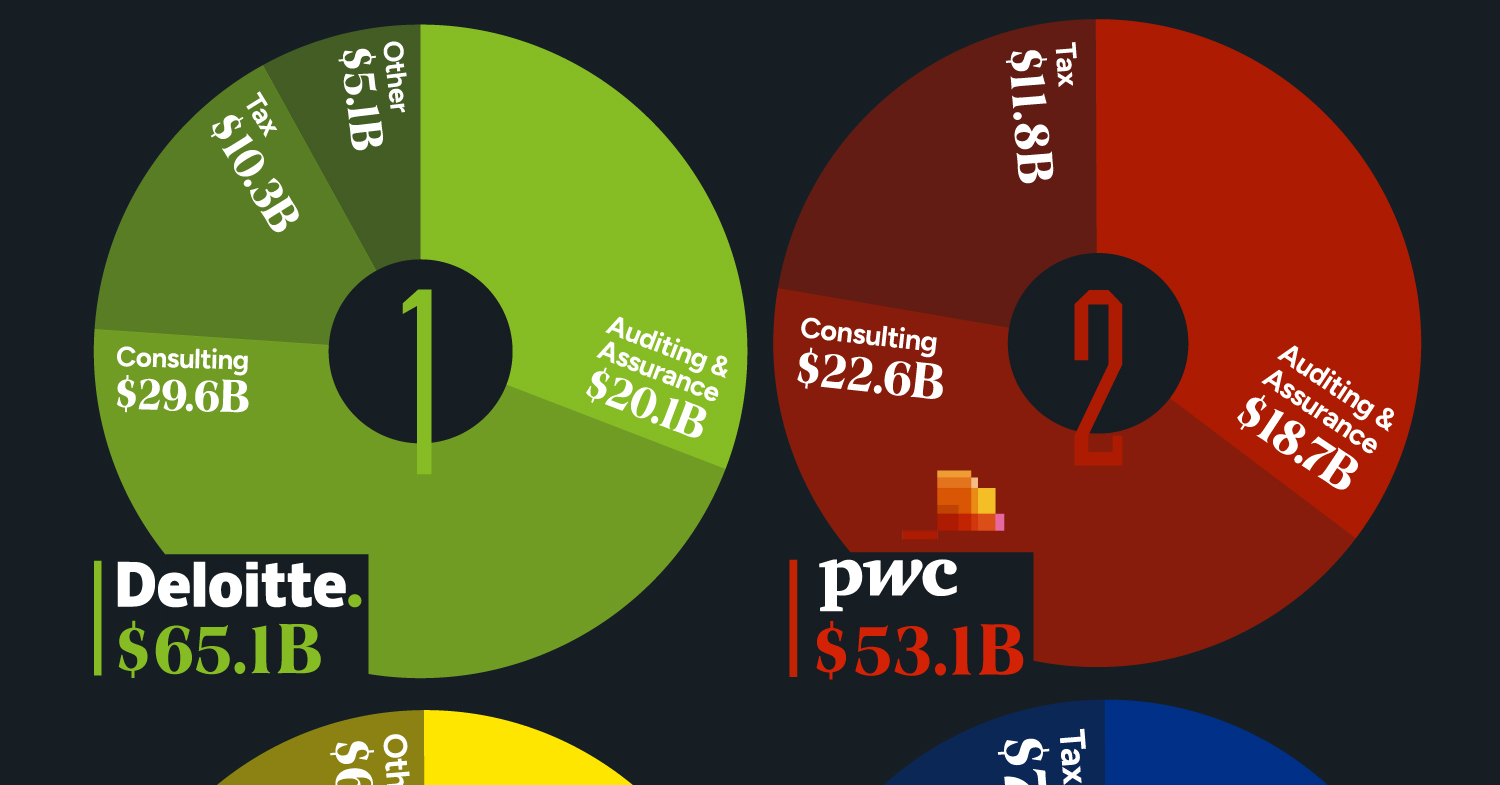
Visualizing the Revenue of the Big Four Accounting Firms
This was originally posted on our Voronoi app. Download the app for free on iOS or Android and discover incredible data-driven charts from a variety of trusted sources.
The Big Four accounting firms – Deloitte, Ernst & Young (EY), PricewaterhouseCoopers (PwC), and KPMG – have solidified their positions as global industry leaders, boasting a combined revenue exceeding $200 billion in 2023.
Together, these firms audit the majority of publicly traded companies worldwide.
This infographic details the revenues of the “Big Four” accounting firms for the fiscal year 2023, based on data from Statista.
Deloitte Leads the Big Four in 2023 Revenues
Offering diverse services, the Big Four specialize in auditing and assurance, ensuring financial transparency, and regulatory compliance for their clients. Additionally, they provide strategic consulting services. All four are legally headquartered in the UK and command a dominant global market share.
| Company | Auditing & Assurance | Consulting | Tax | Other | Total ($ billions) |
|---|---|---|---|---|---|
| Deloitte | $20.1 | $29.6 | $10.3 | $5.1 | $65.1 |
| PwC | $18.7 | $22.6 | $11.8 | $53.1 | |
| EY | $15.1 | $16.1 | $12.1 | $6.1 | $49.4 |
| KPMG | $12.6 | $15.9 | $7.9 | $36.4 |
Interestingly, the largest accounting firms were formerly known as the “Big Eight,” but mergers and closures starting in the late 1980s have reduced their number to four.
The original group consisted of Arthur Andersen, Arthur Young, Coopers & Lybrand, Deloitte Haskin & Sells, Ernst & Whinney, Peat Marwick Mitchell, Price Waterhouse, and Touche Ross, all headquartered in the U.S. or UK.
Arthur Young merged with Ernst & Whinney, and Deloitte Haskin & Sells combined with Touche Ross. Subsequently, Price Waterhouse and Coopers & Lybrand merged their practices, reducing the count to five. However, following the collapse of Arthur Andersen due to its involvement in the Enron scandal, the “Big Five” became the present-day four.
The Scale of the Big Four
Deloitte is the largest in terms of headcount, with over 456,000 employees as of FY2023, followed by Ernst & Young with more than 395,000 workers, and PwC with 364,000. Despite being the smallest among the four, KPMG still has 298,356 employees.
-
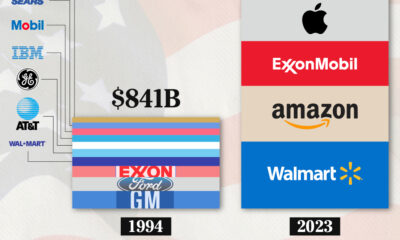
 Business2 weeks ago
Business2 weeks agoAmerica’s Top Companies by Revenue (1994 vs. 2023)
-

 Environment1 week ago
Environment1 week agoRanked: Top Countries by Total Forest Loss Since 2001
-

 Markets1 week ago
Markets1 week agoVisualizing America’s Shortage of Affordable Homes
-
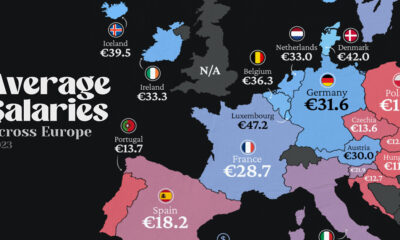
 Maps2 weeks ago
Maps2 weeks agoMapped: Average Wages Across Europe
-

 Mining2 weeks ago
Mining2 weeks agoCharted: The Value Gap Between the Gold Price and Gold Miners
-

 Demographics2 weeks ago
Demographics2 weeks agoVisualizing the Size of the Global Senior Population
-

 Misc2 weeks ago
Misc2 weeks agoTesla Is Once Again the World’s Best-Selling EV Company
-

 Technology2 weeks ago
Technology2 weeks agoRanked: The Most Popular Smartphone Brands in the U.S.




